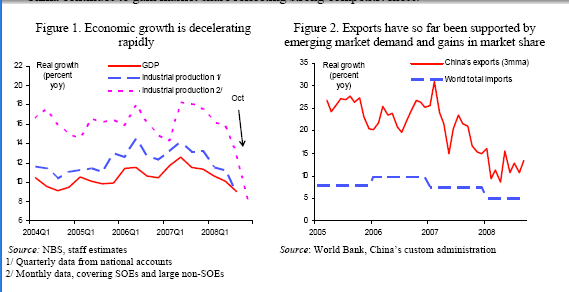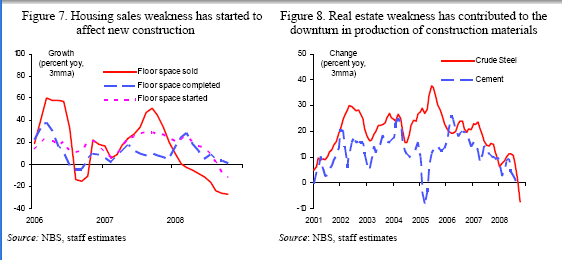
Dynamics

|
Generational Dynamics |
| Forecasting America's Destiny ... and the World's | |
| HOME WEB LOG COUNTRY WIKI COMMENT FORUM DOWNLOADS ABOUT | |
A new World Bank report shows rapid deterioration.
Everyone was shocked on Wednesday when the China's central bank lowered interest rates by more than 1% -- the largest decrease since 1977, and the fourth interest rate decrease in just two months.
This comes just two weeks after China announced a gargantuan stimulus package, as unemployment soars and social unrest grows.
China is following a similar path to the U.S., where each failing bailout attempt is followed shortly after by a newer, larger bailout attempt, with absolutely no limit in sight.
The huge, worldwide credit bubble boosted China's economy, just as it boosted America's economy, and now that the credit bubble is leaking, it's pushing China into the same "Great Depression" as the U.S.
A new World Bank report on China's economy shows clearly how much the economy has deteriorated. This deterioration has become extremely rapid in the last few months, as the construction spree leading up the summer Olympics games in Beijing has been winding down.
I've gone through the report and extracted some of the graphics, which I'll discuss below.
 |
Figure 1 shows how economic growth has been slowing. (SOEs are state-owned enterprises.) According to the report,
Note particularly that the fall in growth accelerated in October. What we're seeing is an accelerating collapse of China's economy, with no reason to believe that the collapse is going to reverse or even level off.
Figure 2 makes the point that China's economy depends on exports, exports have been decreasing. According to the report,
A major theme of the report is the collapse of a Chinese real estate bubble (although the report doesn't use the word "bubble").
A real estate bubble seems to be a part of the lead-up to every major financial crash. When you have a credit bubble going on, creating a lot of new money, then a lot of people believe that they can invest in real estate as a safe investment. After all, "they're not making any more real estate," and "the value of real estate never goes down." Unfortunately, those old sayings are not true in a major credit bubble crash, as the world has recently been discovering.
The most dramatic recent example of this was Japan's real estate bubble of the 1980s. It's incredible, but at its peak, the value of all real estate in Tokyo was greater than the value of all real estate in the United States. That's how huge the bubble was. After the 1990 crash, it was only after 16 years, that real estate prices finally bottomed out.
Now we see that China was also in a real estate bubble, especially in the large eastern industrial cities, and that bubble is starting to leak:
 |
 |
According to the report:
Weakness in real estate construction has contributed to a sharp slowdown in several “upstream” industries. The slowdown in steel and cement gathered pace in October in part in response to large inventory build ups (Figure 8). With these heavy industries decelerating faster than other sectors, “physical indicators” such as of freight volumes and electricity production have slowed significantly more than overall economic activity."
The details of the collapse of the China's real estate bubble are different from those for America's real estate bubble, but the results are the same.
A lot of people make the point that China is a creditor nation and America is a debtor nation, but during times of systemic financial crisis, it really may not make much difference.
America was a creditor nation in the 1920s, but it made little difference in the 1930s. This was described in "The bubble that broke the world." Just because some Brazilian bank owes you some money doesn't mean that you don't have stand in a soup line to eat.
Americans wasted their money by buying, among other things, Chinese manufactured goods. The Chinese wasted their money by investing in, among other things, a bubble stock market and American Treasuries.
One of these is called "consumption," and the other is called "investment." But in the end, there's no difference. Your money is gone. I'll leave it as an exercise to the reader to decide whether people are "happier" if they waste their money on consumption or on worthless investments.
Once the financial crisis is in full force, it makes no difference whether you owe money or you're owed money; either way, you have no money, and no credit is available.
The only thing that matters to an individual, creditor or debtor, is whether he has a job or some form of steady income. In a deflationary environment, even a very small income is enough to survive. The ones who don't survive are the ones who have NO income at all.
China is headed in that direction very quickly. The unemployment situation is 'grim' and getting grimmer. Millions of young migrant workers, who came from rural areas to the big cities to make money to send back to their families, are now out of a job, with no hope of employment. They're headed back to their rural area towns.
For Chinese leaders, already worried about social unrest, this is very significant. China's two previous massive crisis wars -- the Taiping Rebellion of the 1850s-60s, and the Communist Revolution of the 1930s-40s -- were both based on massive rebellions from rural areas.
In 2005, I wrote "China approaches Civil War," saying that a civil war is coming with absolute certainty, when economic conditions are right. Those conditions seem to be occurring right now.
(Comments: For reader comments, questions and discussion, see the China thread of the Generational Dynamics forum.)
Note: Much to my enormous shock and surprise, Paul Krugman's Friday column actually makes sense. It's the first column of his that I've read that isn't loaded to the gills with fatuous political and ideological garbage. Maybe he's had an epiphany? =eod
(28-Nov-2008)
Permanent Link
Receive daily World View columns by e-mail
Donate to Generational Dynamics via PayPal
Web Log Summary - 2016
Web Log Summary - 2015
Web Log Summary - 2014
Web Log Summary - 2013
Web Log Summary - 2012
Web Log Summary - 2011
Web Log Summary - 2010
Web Log Summary - 2009
Web Log Summary - 2008
Web Log Summary - 2007
Web Log Summary - 2006
Web Log Summary - 2005
Web Log Summary - 2004
Web Log - December, 2016
Web Log - November, 2016
Web Log - October, 2016
Web Log - September, 2016
Web Log - August, 2016
Web Log - July, 2016
Web Log - June, 2016
Web Log - May, 2016
Web Log - April, 2016
Web Log - March, 2016
Web Log - February, 2016
Web Log - January, 2016
Web Log - December, 2015
Web Log - November, 2015
Web Log - October, 2015
Web Log - September, 2015
Web Log - August, 2015
Web Log - July, 2015
Web Log - June, 2015
Web Log - May, 2015
Web Log - April, 2015
Web Log - March, 2015
Web Log - February, 2015
Web Log - January, 2015
Web Log - December, 2014
Web Log - November, 2014
Web Log - October, 2014
Web Log - September, 2014
Web Log - August, 2014
Web Log - July, 2014
Web Log - June, 2014
Web Log - May, 2014
Web Log - April, 2014
Web Log - March, 2014
Web Log - February, 2014
Web Log - January, 2014
Web Log - December, 2013
Web Log - November, 2013
Web Log - October, 2013
Web Log - September, 2013
Web Log - August, 2013
Web Log - July, 2013
Web Log - June, 2013
Web Log - May, 2013
Web Log - April, 2013
Web Log - March, 2013
Web Log - February, 2013
Web Log - January, 2013
Web Log - December, 2012
Web Log - November, 2012
Web Log - October, 2012
Web Log - September, 2012
Web Log - August, 2012
Web Log - July, 2012
Web Log - June, 2012
Web Log - May, 2012
Web Log - April, 2012
Web Log - March, 2012
Web Log - February, 2012
Web Log - January, 2012
Web Log - December, 2011
Web Log - November, 2011
Web Log - October, 2011
Web Log - September, 2011
Web Log - August, 2011
Web Log - July, 2011
Web Log - June, 2011
Web Log - May, 2011
Web Log - April, 2011
Web Log - March, 2011
Web Log - February, 2011
Web Log - January, 2011
Web Log - December, 2010
Web Log - November, 2010
Web Log - October, 2010
Web Log - September, 2010
Web Log - August, 2010
Web Log - July, 2010
Web Log - June, 2010
Web Log - May, 2010
Web Log - April, 2010
Web Log - March, 2010
Web Log - February, 2010
Web Log - January, 2010
Web Log - December, 2009
Web Log - November, 2009
Web Log - October, 2009
Web Log - September, 2009
Web Log - August, 2009
Web Log - July, 2009
Web Log - June, 2009
Web Log - May, 2009
Web Log - April, 2009
Web Log - March, 2009
Web Log - February, 2009
Web Log - January, 2009
Web Log - December, 2008
Web Log - November, 2008
Web Log - October, 2008
Web Log - September, 2008
Web Log - August, 2008
Web Log - July, 2008
Web Log - June, 2008
Web Log - May, 2008
Web Log - April, 2008
Web Log - March, 2008
Web Log - February, 2008
Web Log - January, 2008
Web Log - December, 2007
Web Log - November, 2007
Web Log - October, 2007
Web Log - September, 2007
Web Log - August, 2007
Web Log - July, 2007
Web Log - June, 2007
Web Log - May, 2007
Web Log - April, 2007
Web Log - March, 2007
Web Log - February, 2007
Web Log - January, 2007
Web Log - December, 2006
Web Log - November, 2006
Web Log - October, 2006
Web Log - September, 2006
Web Log - August, 2006
Web Log - July, 2006
Web Log - June, 2006
Web Log - May, 2006
Web Log - April, 2006
Web Log - March, 2006
Web Log - February, 2006
Web Log - January, 2006
Web Log - December, 2005
Web Log - November, 2005
Web Log - October, 2005
Web Log - September, 2005
Web Log - August, 2005
Web Log - July, 2005
Web Log - June, 2005
Web Log - May, 2005
Web Log - April, 2005
Web Log - March, 2005
Web Log - February, 2005
Web Log - January, 2005
Web Log - December, 2004
Web Log - November, 2004
Web Log - October, 2004
Web Log - September, 2004
Web Log - August, 2004
Web Log - July, 2004
Web Log - June, 2004